
By Mary Beth Kane
From the time we enter this world, even while we are still in our mother’s womb, education is promoted as critical. Our parents read to us in the belly, and education is continually encouraged throughout our lives well until we are considered experts in our chosen careers. But what happens in middle age and later in life, when our physical and intellectual growth rate may slow or decline? How is learning viewed once the university degrees have been obtained, the continuous development courses taken, and the career comes to an end? What then happens to this appetite for learning during our precious senior years?
Age is often associated with a decline in cognitive abilities, such as learning new skills, which we know to be important for maintaining functional independence. Many forms of motor learning appear to be relatively well preserved with age, while learning tasks that involve memory tend to be negatively affected. This poses a challenge for the growing aging population since successful aging requires the ability to learn new information to perform complex tasks. A concerted effort must be put forth as we grow older to strengthen these intellectual abilities and maintain our love for lifelong learning.
I once read that the goal should be to retire to something, not from something. We do this by staying engaged, physically active, and intellectually curious. In my work in senior living, I see how easy it would be for senior living communities and seniors to focus more on the former two and overlook the latter. While there may be lots of support for social engagement or physical activity, intellectual curiosity may be treated as a personal thing, up to everyone to pursue on their own.
Although this may be true, having systems in place which foster intellectual curiosity and senior learning is imperative for living a healthy and well-balanced life. For instance, Arbor Terrace senior living communities, have memberships to programs like One Day University, giving residents access to courses, hundreds of talks, and lectures from professors.
Not allowing oneself to lose that passion for reading, mathematics, science, or the arts by keeping books, resources, and reference material around is another way to be intentional about learning something new every day. Surround yourself with bright, interesting people, no matter your age, consume new knowledge with vigor and retain it, as if you will live forever.
Mary Beth is a Senior Care Counselor for the Arbor Company and can be reached at marybeth.kane@arborcompany.com



